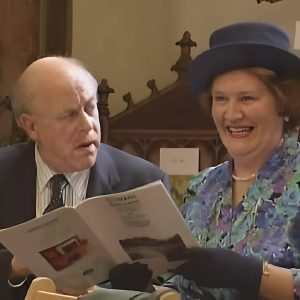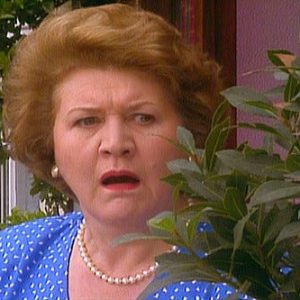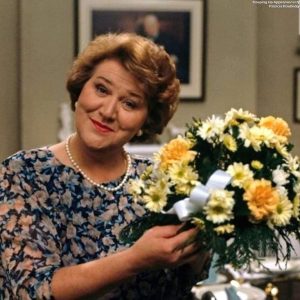In the golden summer of 1969, as Britain simmered with social upheaval and cultural reinvention, something extraordinary was unfolding on a quieter stage in West Sussex. Amidst the ivy-draped serenity of the Chichester Festival Theatre (CFT), a seismic shift in the theatrical landscape was underway. It was the season that marked the electrifying debut of Patricia Routledge at Chichester—an arrival that would resonate through the corridors of British theatre for decades to come.
That year, Routledge took the stage in not one, not two, but three of the four major productions on CFT’s roster. Her range dazzled, her presence commanded, and her artistry heralded the rise of a performer who would become a cornerstone of Chichester’s storied legacy.
A Season of Versatility and Brilliance
Patricia Routledge’s Chichester debut was nothing short of a theatrical tour de force. In the satirical depths of Bertolt Brecht’s The Caucasian Chalk Circle, she immersed herself in the politically charged storytelling that demanded both technical precision and emotional depth. The play, a parable of justice and motherhood, relies heavily on the actor’s ability to navigate shifting tones and roles—terrain where Routledge flourished. Her performance mirrored Brecht’s vision of epic theatre: emotionally resonant yet intellectually incisive.
From Brechtian grit, she transitioned seamlessly into Victorian farce in Arthur Wing Pinero’s The Magistrate. But this wasn’t just any production. It starred the legendary Alastair Sim—an actor with a face “God-given,” as Routledge herself once described, and a presence as potent as it was enigmatic. For Routledge, playing opposite Sim was more than a career milestone; it was a masterclass in stagecraft.
“The reason I came to Chichester in 1969 was to play opposite Alastair Sim in The Magistrate, which was unforgettably wonderful,” Routledge later recalled. “That God-given face to start with and then, when it starts to move, it is even more interesting, and then when it moves with the mind and the intention behind it, even more wonderful.”
The play, a chaotic romp through mistaken identities and judicial absurdity, saw Routledge delivering comedic brilliance without ever chasing a laugh. Like Sim, she understood that comedy—true comedy—springs from character, from sincerity, from timing so perfect it feels invisible. Their chemistry was electric. Audiences packed the house night after night, with latecomers relegated to standing room at the back.
Yet it wasn’t just Routledge’s skill that audiences remembered—it was her presence, her grace, and the sense that something rare was unfolding before them.
From Farce to Restoration Wit
Closing out the season with equal command, Routledge took on Lady Fidget in William Wycherley’s The Country Wife, one of the most provocative and enduring comedies of the Restoration era. The role, arch and archly comic, pits Routledge’s Lady Fidget against the rakish charms of Horner and a society obsessed with appearances.
Playing alongside the luminous Maggie Smith—herself on the cusp of cinematic immortality with The Prime of Miss Jean Brodie—Routledge held her own in a production that shimmered with elegance and sting. Lady Fidget, with her mix of self-righteous virtue and thinly veiled desire, proved a delicious contrast to Routledge’s previous roles that season. Once again, she demonstrated her range: equal parts saucy and stately, sharp as flint and smooth as cream.
It was this performance, sandwiched between Brechtian parable and Victorian comedy, that cemented Routledge’s reputation not just as a capable actress, but as a chameleon—effortlessly adapting to whatever theatrical world she inhabited.
A Legacy Forged in Chichester
For Chichester Festival Theatre, Routledge’s arrival was a blessing that kept on giving. In the years following her 1969 debut, she would become a cherished figure at CFT, returning time and again to lend her formidable talent to productions both classic and contemporary.
She sparkled as the indomitable Aunt Georgina in Dandy Dick (1973), where her comedic timing once again stole scenes and hearts. In The Rivals (1994), she brought Mrs. Malaprop’s mangled metaphors to life with hilarious dignity. And in Beatrix (1996), she portrayed Beatrix Potter with quiet emotional power, exploring the author’s inner life beyond the beloved tales of Peter Rabbit.
In Office Suite (2007), a pair of one-act plays by Alan Bennett, she reunited with the language and nuance of modern British drama, offering performances rich in wit, poignancy, and observation.
Over a dozen productions later, Routledge’s bond with CFT remains one of mutual respect, artistic exploration, and enduring affection. Her every return is greeted with both nostalgia and anticipation—a theatrical homecoming of the highest order.
Lessons from a Legend
Beyond the roles and the accolades, Routledge’s reflections on her 1969 debut are perhaps most telling of the humility and insight she has brought to her career.
“I learned from [Sim] never to be impatient with a slow audience,” she once said. “He knew he could woo them to his knees, never playing for laughs.”
It’s a lesson that underscores Routledge’s own approach: a commitment to truth in performance, a deep respect for the audience, and a refusal to pander. She, like Sim, understands that great acting is not in the volume or velocity, but in the detail—the flicker of intention behind a glance, the restraint behind a gesture, the silence between the lines.
A Theatrical Era Defined
The 1969 season at Chichester wasn’t just another chapter in the theatre’s history—it was a defining moment. With Patricia Routledge at its center, it became a crucible of talent, tradition, and transformation. In a time when British theatre was exploring new political and social frontiers, Chichester offered a space for classical mastery, for performances that honored the past while speaking to the present.
And for Routledge, it was the beginning of a lifelong love affair—with the stage, with the theatre, and with an audience that continues to be captivated by her every performance.
As the curtain rises on each new season at Chichester, the echo of 1969 still lingers—an echo shaped, in no small part, by the unforgettable arrival of one Patricia Routledge.
Let me know if you’d like this formatted for publication, adapted into a press release, or accompanied by visuals or captions!





